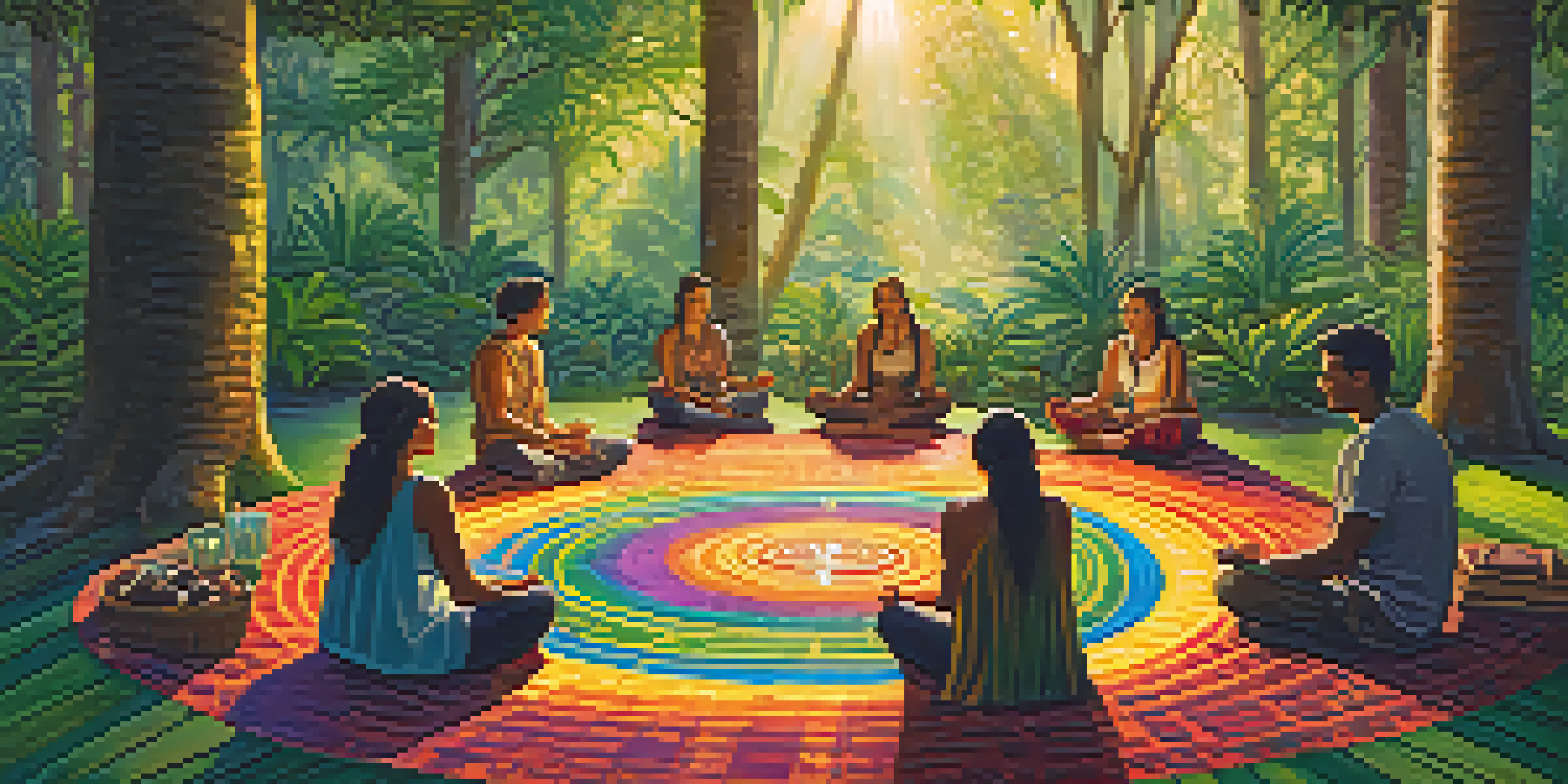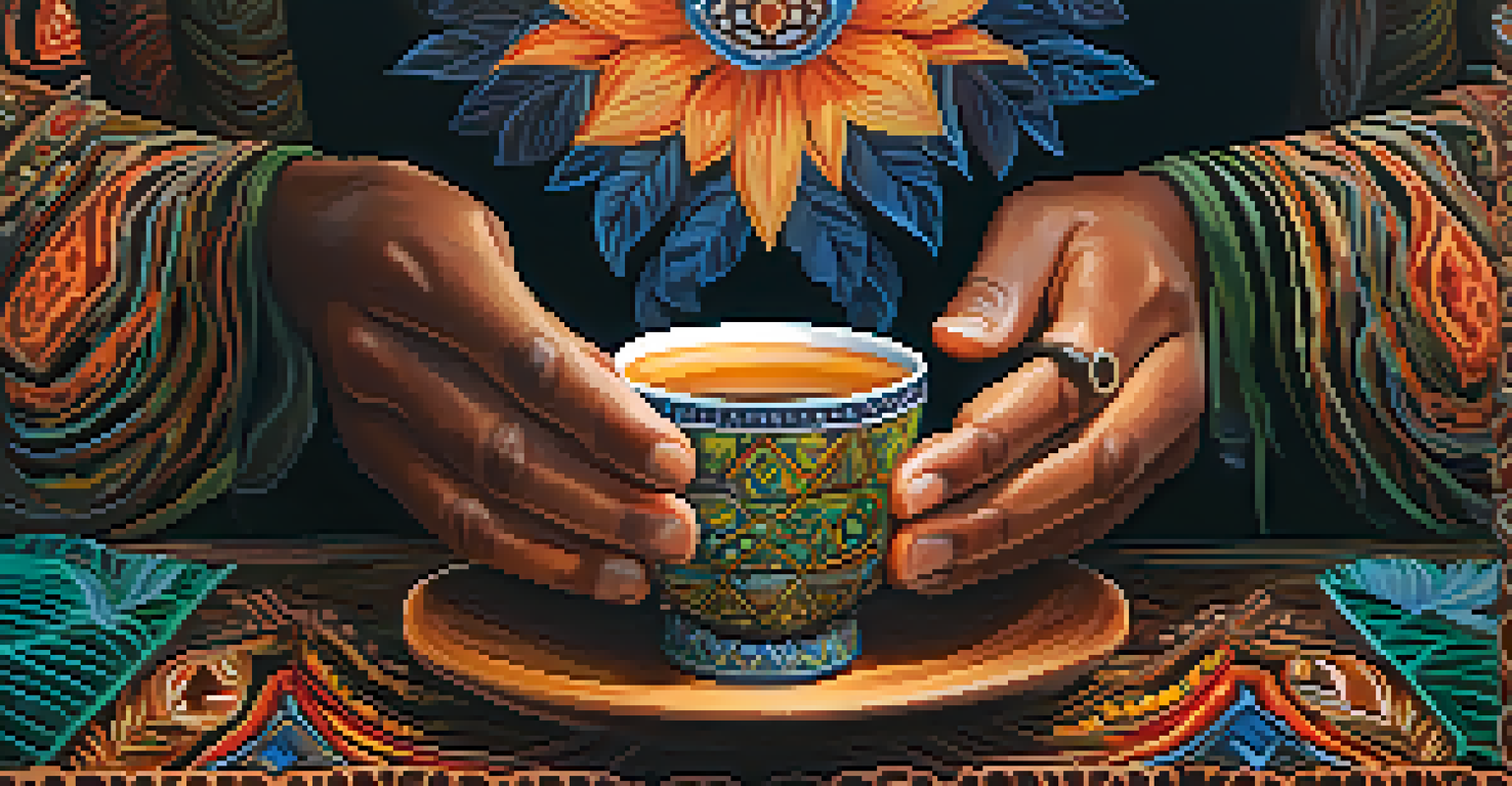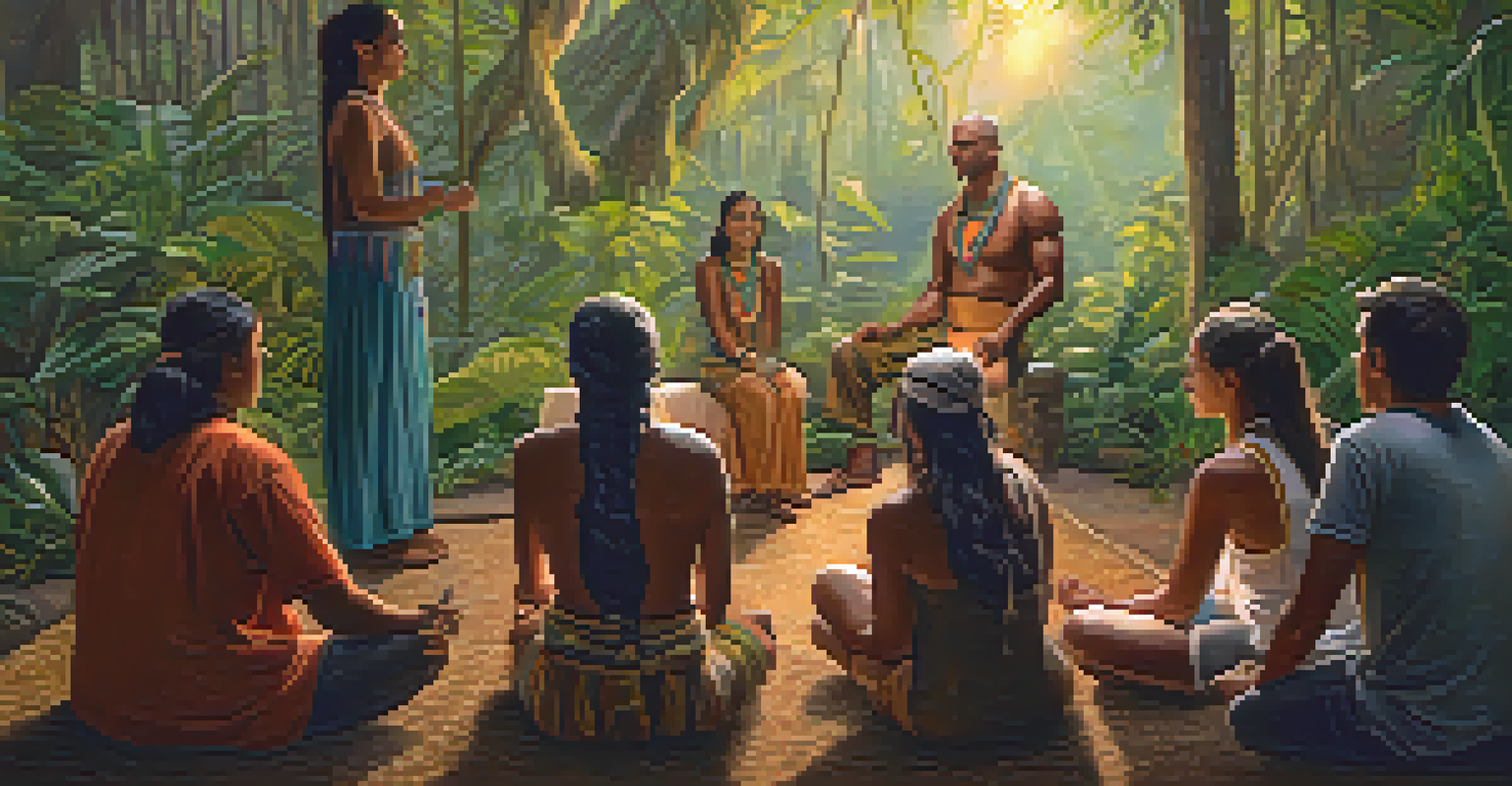Conflict Resolution in Ayahuasca Group Experiences

Understanding Conflict in Ayahuasca Ceremonies
Conflict can arise in any group setting, and Ayahuasca ceremonies are no exception. The powerful experiences during these sessions can evoke strong emotions, leading to misunderstandings among participants. Recognizing the potential for conflict is the first step in fostering a supportive environment.
Conflict is the beginning of consciousness.
In an Ayahuasca circle, individuals often dive deep into their personal traumas, which can trigger reactions from others. For example, if one person feels vulnerable while another expresses frustration, it may create tension in the space. Understanding these dynamics helps participants approach conflicts with empathy and awareness.
Ultimately, acknowledging that conflict is a natural part of group experiences allows participants to prepare themselves mentally. By fostering open communication and compassion, groups can create a safe atmosphere where conflicts can be addressed constructively.
Common Sources of Conflict in Group Settings
In Ayahuasca groups, conflicts often stem from differences in personal beliefs and expectations. Each participant comes with unique backgrounds and perspectives, which can clash during the ceremony. For instance, one person may have a more spiritual approach, while another focuses on the psychological aspects of the experience.

Additionally, sharing a sacred space can amplify emotions, leading to conflicts that might seem trivial outside of the ceremony. Participants may misinterpret each other's actions or words, resulting in hurt feelings. Recognizing these common sources of conflict can help individuals prepare for potential issues.
Conflict is Natural in Ceremonies
Recognizing that conflict can arise during Ayahuasca ceremonies helps participants prepare and foster a supportive environment.
Understanding these dynamics empowers participants to navigate conflicts with greater ease. By being aware of their own triggers and the triggers of others, individuals can approach disagreements with a mindset of curiosity and understanding.
The Role of Facilitators in Conflict Resolution
Facilitators play a crucial role in managing conflicts during Ayahuasca group experiences. Their responsibility includes creating a safe and nurturing environment where participants feel heard and respected. When conflicts arise, a skilled facilitator can help mediate conversations and guide individuals toward resolution.
Out of your vulnerabilities will come your strength.
For example, a facilitator may encourage participants to share their feelings openly, fostering an atmosphere of trust. This can help individuals express their emotions without fear of judgment, leading to a deeper understanding of one another. Effective facilitation can transform potential conflicts into opportunities for growth.
Moreover, facilitators can provide tools for conflict resolution, such as active listening techniques and mindfulness exercises. By equipping participants with these skills, facilitators empower them to address conflicts directly and constructively, enhancing the overall group experience.
Techniques for Effective Communication
Effective communication is essential for resolving conflicts in Ayahuasca groups. One technique that can be particularly helpful is using 'I' statements, which allow individuals to express their feelings without placing blame. For instance, saying 'I felt hurt when...' fosters understanding rather than defensiveness.
Active listening is another crucial skill in conflict resolution. This involves fully concentrating, understanding, and responding thoughtfully to what others are saying. By practicing active listening, participants can create a more empathetic environment where everyone feels valued and understood.
Facilitators Guide Conflict Resolution
Skilled facilitators create safe spaces and provide tools that empower participants to address conflicts constructively.
Additionally, incorporating mindfulness practices can help participants stay centered during conflicts. Techniques such as deep breathing or meditation can ground individuals, allowing for clearer communication and reducing the intensity of emotions.
Creating a Safe Space for Vulnerability
Establishing a safe space is vital for addressing conflicts in Ayahuasca ceremonies. Participants must feel secure enough to express their thoughts and emotions honestly. This can be achieved by setting clear intentions at the beginning of the ceremony, emphasizing respect and support for one another.
A safe space encourages vulnerability, allowing individuals to share their experiences without fear of judgment. When participants witness their peers being open and honest, it fosters a sense of community and trust. This shared understanding can significantly reduce the likelihood of conflicts escalating.
Moreover, creating rituals or practices that reinforce this safe environment can further enhance group dynamics. Simple acts like group hugs or sharing affirmations can help strengthen bonds among participants, making it easier to navigate conflicts as they arise.
Embracing Conflict as a Growth Opportunity
While conflicts can be uncomfortable, they also present unique opportunities for personal and collective growth. Acknowledging and addressing conflicts can lead to deeper connections among participants, as it encourages vulnerability and authenticity. Embracing these moments can transform the group experience into something profoundly meaningful.
For instance, when participants work through conflicts together, they often discover shared experiences and insights. This process can lead to greater empathy and understanding, enriching the overall group dynamic. Rather than fearing conflict, participants can learn to view it as an essential part of their journey.
Embrace Conflict for Growth
Viewing conflict as an opportunity for personal and collective growth can deepen connections among participants.
Ultimately, embracing conflict allows individuals to grow both personally and spiritually. By recognizing that challenges can lead to healing, participants can approach conflict with an open heart and mind, fostering a more profound sense of connection within the group.
Post-Ceremony Reflection and Integration
After an Ayahuasca ceremony, taking time for reflection can be invaluable for conflict resolution. Participants should consider how conflicts were handled and what they learned from the experience. This reflection can help individuals integrate their insights and emotions into their everyday lives.
Creating a dialogue after the ceremony allows participants to share their thoughts and feelings about the conflicts that arose. This open conversation can promote healing and understanding, ensuring that everyone feels acknowledged. Additionally, discussing conflicts in a supportive environment reinforces the lessons learned during the ceremony.

Integration is crucial for long-lasting growth. By reflecting on and discussing conflicts, participants can carry the lessons forward, helping them navigate future challenges with greater ease and compassion.